New Mexico is suing Google, Twitter and other companies that develop and market mobile gaming apps for children, saying the apps violate state and federal laws by collecting personal information that could compromise privacy.
The lawsuit filed in federal court late Tuesday comes as data-sharing concerns persist among users.
Social media giant Facebook just weeks ago pulled one of its own apps over possible privacy intrusions and a recent Associated Press investigation revealed that several Google apps and websites store user location even if users have turned off location history.
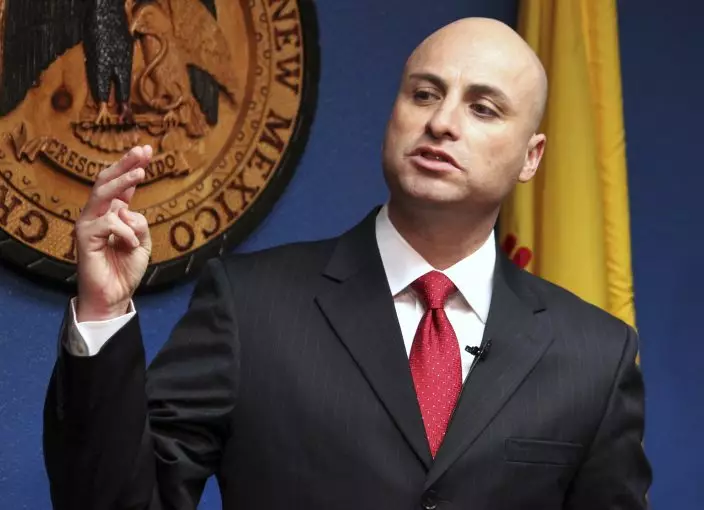
FILE - In this Jan. 29, 2015 file photo, New Mexico Attorney General Hector Balderas talks during a news conference in Albuquerque, N.M. New Mexico is suing Google, Twitter and other companies that develop and market mobile gaming apps for children, saying the apps violate state and federal laws by collecting personal information that could compromise privacy. The lawsuit filed in federal court late Tuesday, Sept. 11, 2018, comes as data-sharing concerns persist among users. (AP PhotoSusan Montoya Bryan, File)
New Mexico Attorney General Hector Balderas said he's concerned given that the apps can track with such precision where children live, play and go to school.
"These multi-million-dollar tech companies partnering with app developers are taking advantage of New Mexican children, and the unacceptable risk of data breach and access from third parties who seek to exploit and harm our children will not be tolerated in New Mexico," he said.
The lawsuit accuses advertising businesses run by Google, Twitter and three other companies, along with the app maker Tiny Lab Productions, of violating a law meant to keep private the personal data of children under 13.
The Children's Online Privacy Protection Act adopted by Congress requires websites and online services to disclose what information they collect from children and how they use that information.
That disclosure must also be provided directly to parents and verified consent must be given. The lawsuit accuses the defendants of violating these federal mandates.
Google said in a statement Wednesday that apps included in its family program must comply with stringent policies that address age-appropriate ads and privacy disclosures. The company also said those apps must comply with the federal law.
The company said it is "constantly working to improve the program."
Twitter said Tiny Lab was suspended from its MoPub platform a year ago for violating policies regarding child-directed apps. That privacy policy does not permit MoPub Services to be used to collect information from apps directed to children under the age of 13 for purposes of personalized advertising.
On its website, Tiny Lab posted that the company is not violating federal privacy laws regarding children since it asks for the birth date of the user to determine their age according to federal guidelines.
If a user is under 13, none of the personal information is collected, it says. But the lawsuit argues that's not enough.
Tech companies are under increasing scrutiny over their data practices, following a series of privacy scandals at Facebook and new data-privacy rules recently adopted by the European Union.
Last year, the business news site Quartz found that Google was tracking Android users by collecting the addresses of nearby cellphone towers even if all location services were off. Google changed the practice and insisted it never recorded the data anyway.
Critics have said Google's insistence on tracking its users stems from its drive to boost advertising revenue. It can charge advertisers more if they want to narrow ad delivery to people who've visited certain locations.
According to the lawsuit, Google was notified earlier this year by security researchers at the University of California-Berkeley that they had identified privacy-invasive technology and practices in Tiny Lab's gaming apps.
Google responded to the researchers, saying that the apps were not designed primarily for children, but for families in general so there were no violations of the federal privacy laws.
New Mexico prosecutors said in the lawsuit that the defendants were aware of the violations yet have failed to take steps to cure the misconduct.
They are seeking civil penalties and asking the court for a permanent injunction to prevent further violations of the laws.
TOKYO (AP) — The American envoy to the United Nations called Friday for countries armed with atomic weapons to pursue nuclear disarmament as she visited the atomic bomb museum in Nagasaki, Japan.
Linda Thomas-Greenfield, who became the first U.S. cabinet member to visit Nagasaki, stressed the importance of dialogue and diplomacy amid a growing nuclear threat in the region.
“We must continue to work together to create an environment for nuclear disarmament. We must continue to prevent the spread of nuclear weapons in every corner of the world,” she said after a tour of the atomic bomb museum.
“For those of us who already have those weapons, we must pursue arms control. We can and must work to ensure that Nagasaki is the last place to ever experience the horror of nuclear weapons,” she added, standing in front of colorful hanging origami cranes, a symbol of peace.
The United States dropped the world’s first atomic bomb on Hiroshima on Aug. 6, 1945, destroying the city and killing 140,000 people. A second attack three days later on Nagasaki killed 70,000 more people. Japan surrendered on Aug. 15, ending World War II and its nearly half-century of aggression in Asia.
Nagasaki Gov. Kengo Oishi said in a statement that he believed Thomas-Greenfield's visit and her first-person experience at the museum “will be a strong message in promoting momentum of nuclear disarmament for the international society at a time the world faces a severe environment surrounding atomic weapons.”
Oishi said he conveyed to the ambassador the increasingly important role of Nagasaki and Hiroshima in emphasizing the need of nuclear disarmament.
Thomas-Greenfield's visit to Japan comes on the heels of Prime Minister Fumio Kishida's official visit to the United States last week and is aimed at deepening Washington's trilateral ties with Tokyo and Seoul. During her visit to South Korea earlier this week, she held talks with South Korean officials, met with defectors from North Korea and visited the demilitarized zone.
The ambassador said the United States is looking into setting up a new mechanism for monitoring North Korea's nuclear weapons program. Russia and China have thwarted U.S.-led efforts to step up U.N. sanctions on North Korea over its ballistic missile testing since 2022, underscoring a deepening divide between permanent Security Council members over Russia’s war on Ukraine.
She said it would be “optimal” to launch the new system next month, though it is uncertain if that is possible.
The U.N. Security Council established a committee to monitor sanctions, and the mandate for its panel of experts to investigate violations had been renewed for 14 years until last month, when Russia vetoed another renewal.
In its most recent report, the panel of experts said it is investigating 58 suspected North Korean cyberattacks between 2017 and 2023 valued at approximately $3 billion, with the money reportedly being used to help fund its weapons development.
The United States, Japan and South Korea have been deepening security ties amid growing tension in the region from North Korea and China.
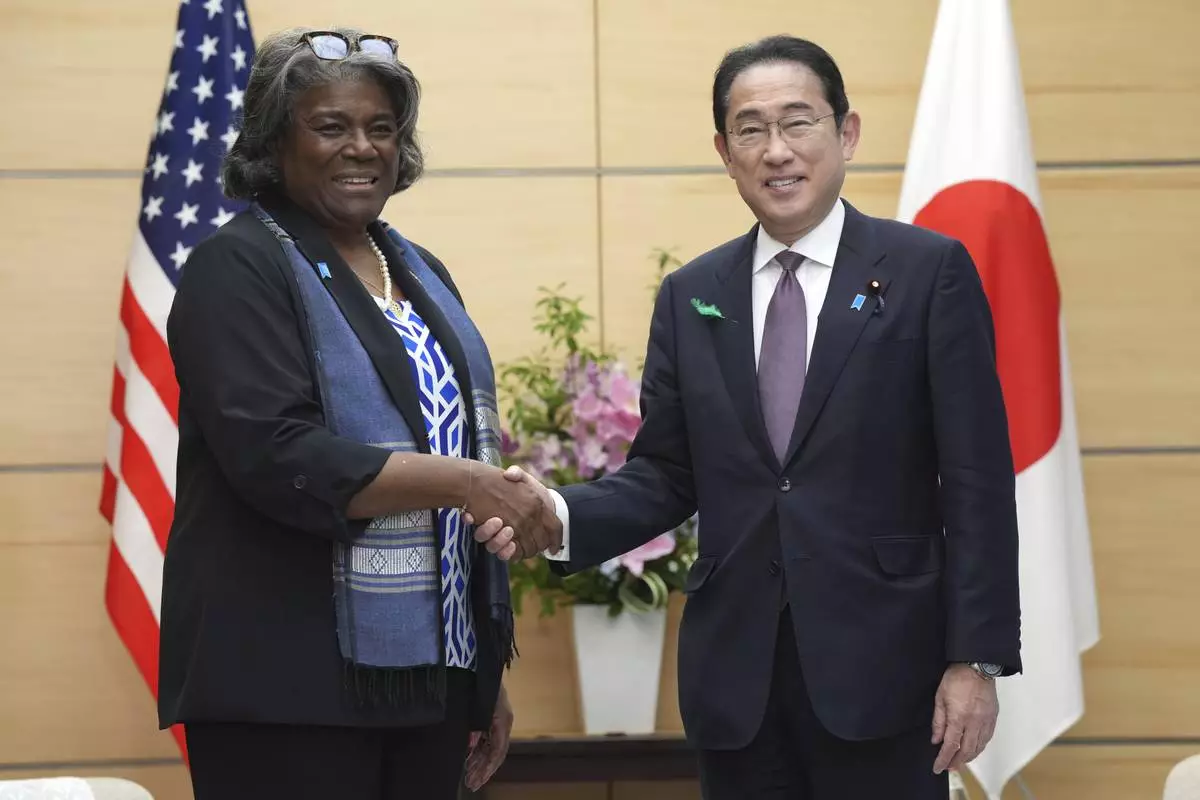
U.S. Ambassador to United Nations Linda Thomas-Greenfield, left, and Japan's Prime Minister Fumio Kishida, right, shake hands during a meeting Friday, April 19, 2024, at prime minister's office in Tokyo. (AP Photo/Eugene Hoshiko, Pool)
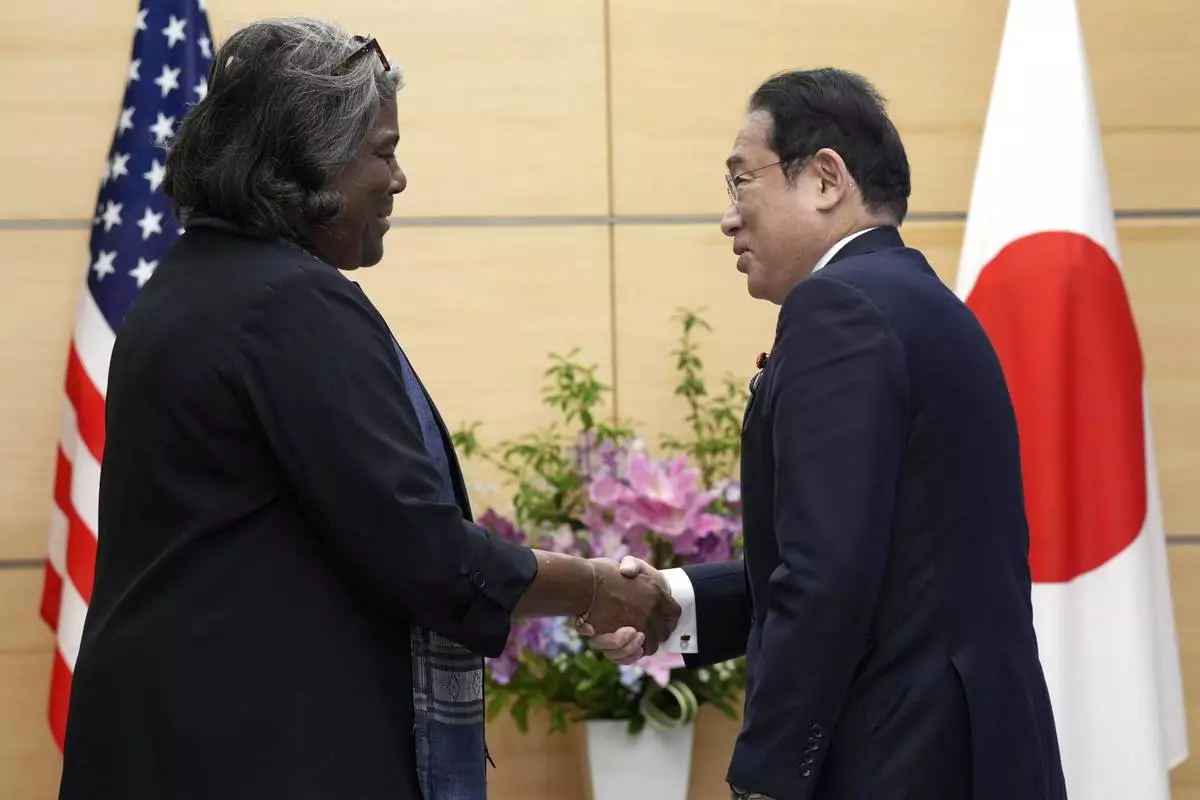
U.S. Ambassador to United Nations Linda Thomas-Greenfield, left, and Japan's Prime Minister Fumio Kishida, right, shake hands during a meeting Friday, April 19, 2024, at prime minister's office in Tokyo. (AP Photo/Eugene Hoshiko, Pool)
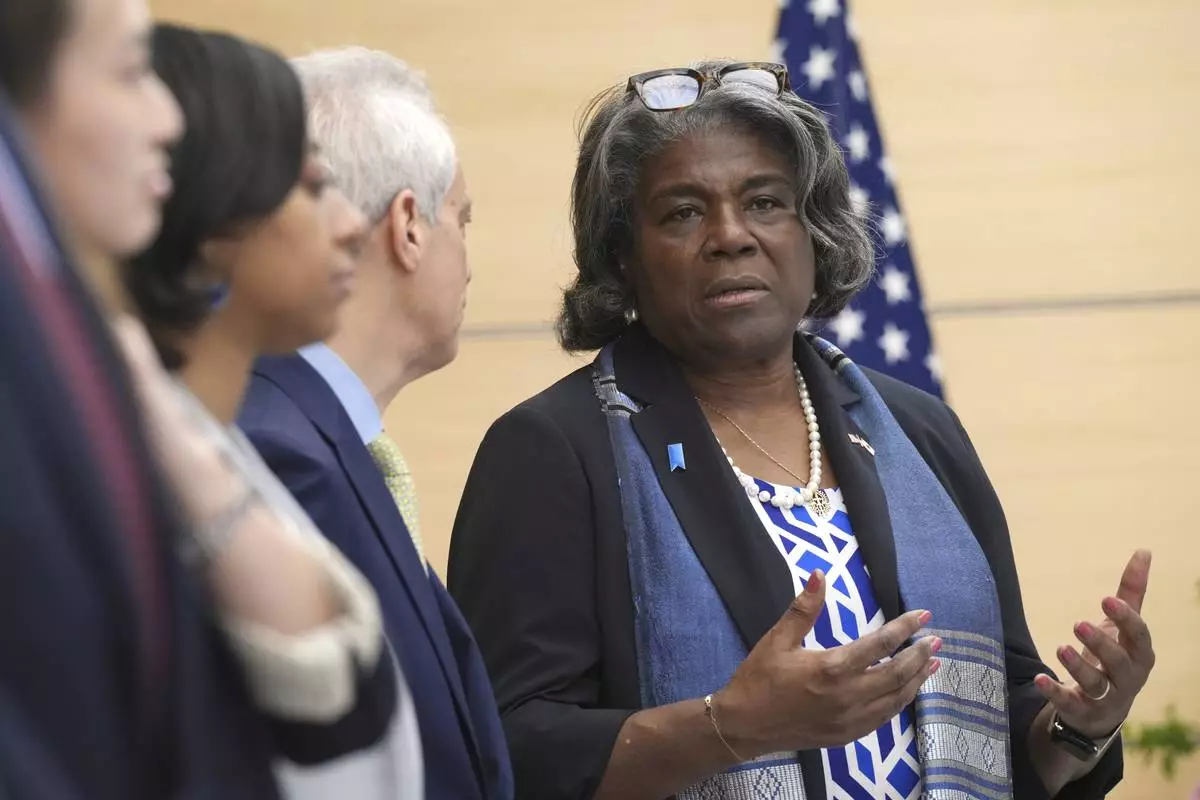
U.S. Ambassador to United Nations Linda Thomas-Greenfield, right, speaks to Rahm Emanuel, U.S. Ambassador to Japan, second right, as they wait for a meeting with Japan's Prime Minister Fumio Kishida Friday, April 19, 2024, at prime minister's office in Tokyo. (AP Photo/Eugene Hoshiko, Pool)
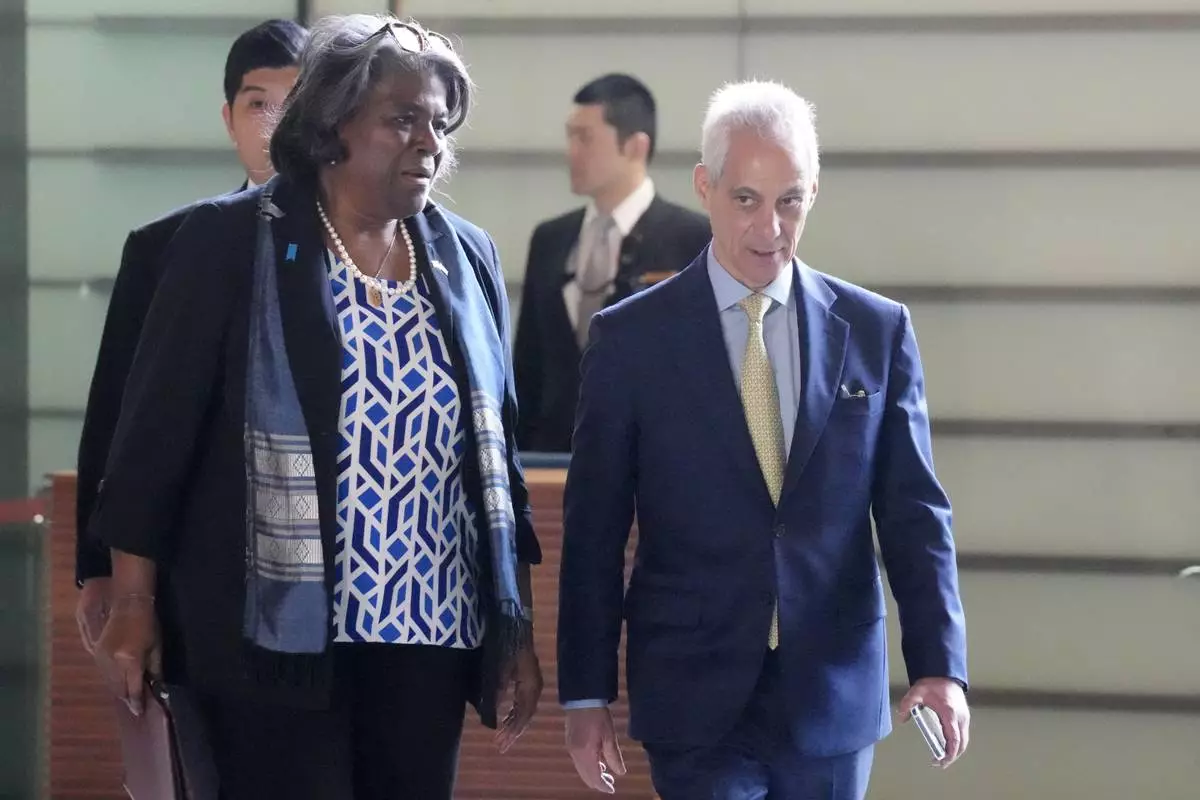
U.S. Ambassador to United Nations Linda Thomas-Greenfield, left, and Rahm Emanuel, U.S. Ambassador to Japan, right, walk to meet Japan's Prime Minister Fumio Kishida Friday, April 19, 2024, at prime minister's office in Tokyo. (AP Photo/Eugene Hoshiko, Pool)
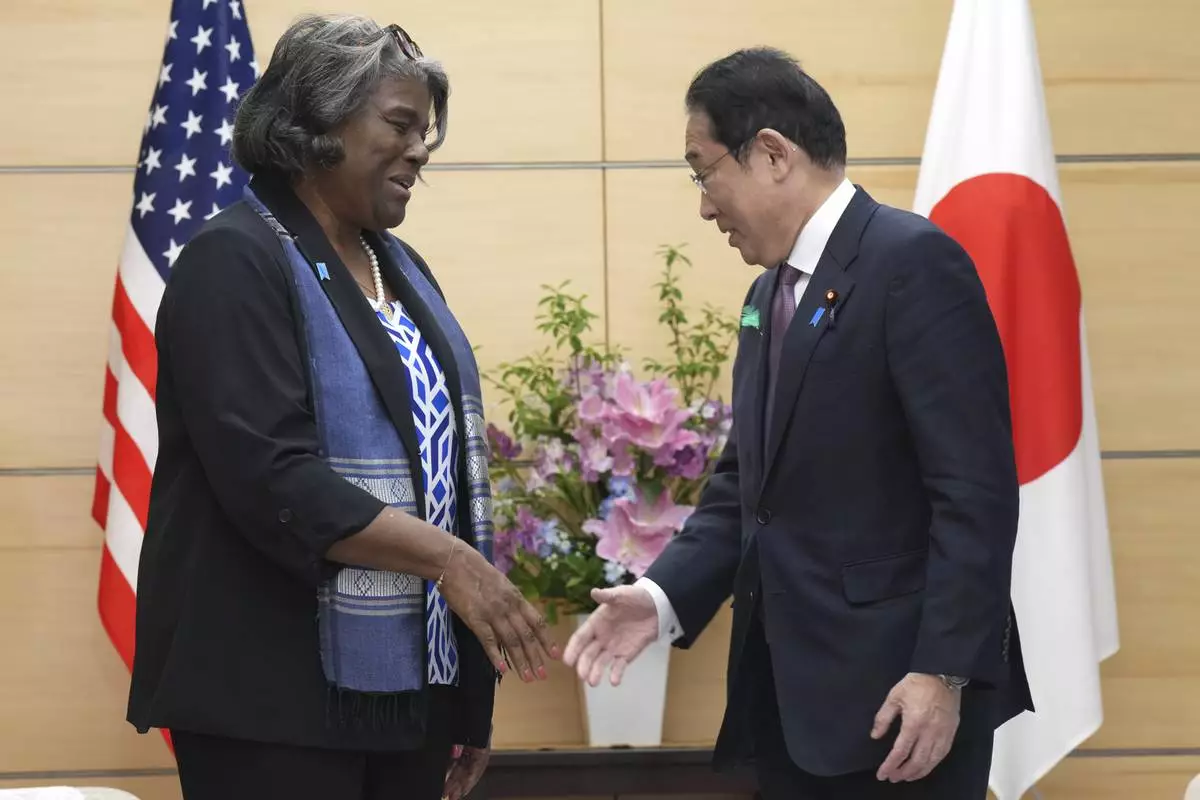
U.S. Ambassador to United Nations Linda Thomas-Greenfield, left, and Japan's Prime Minister Fumio Kishida, right, talk prior to a meeting Friday, April 19, 2024, at prime minister's office in Tokyo. (AP Photo/Eugene Hoshiko, Pool)
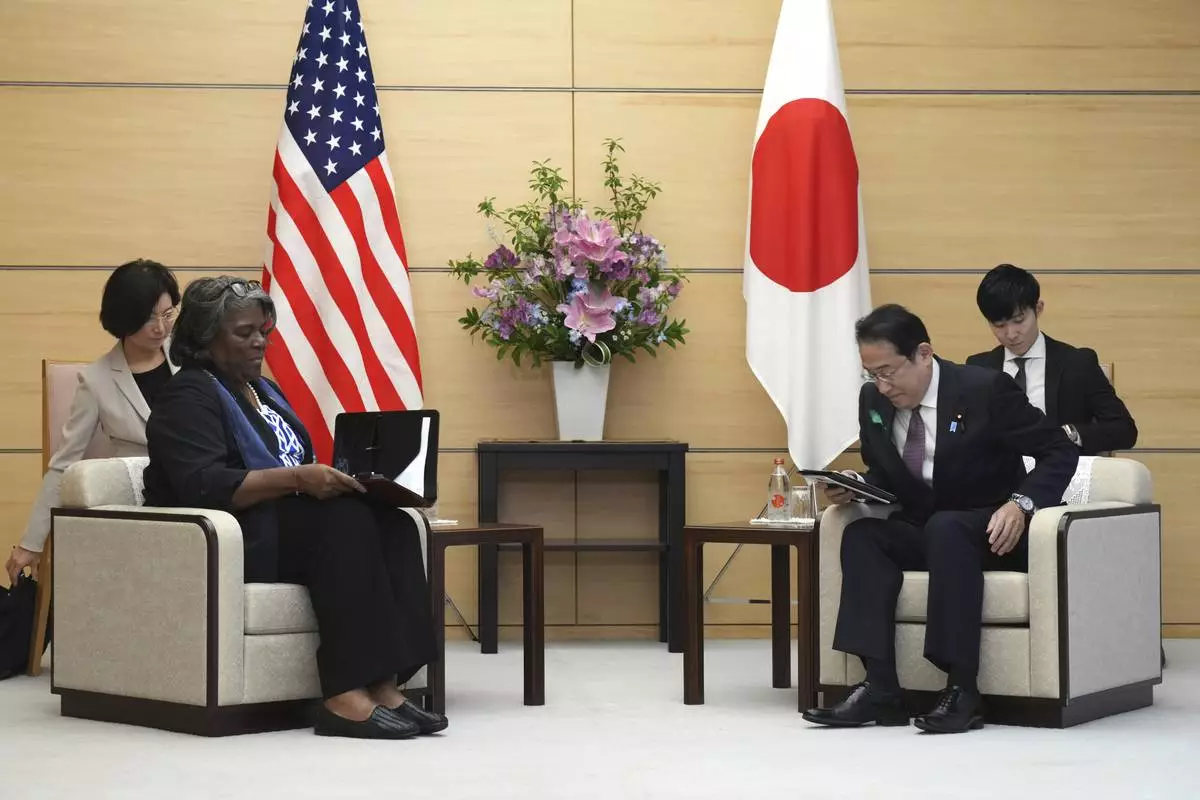
U.S. Ambassador to United Nations Linda Thomas-Greenfield, left, and Japan's Prime Minister Fumio Kishida, right, prepare to talk during a meeting Friday, April 19, 2024, at prime minister's office in Tokyo. (AP Photo/Eugene Hoshiko, Pool)
















